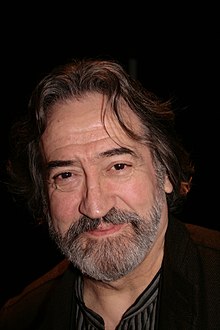Jordi Savall, one of the greats of Early Music.......experimenting with a bit of improvisation, or so it would seem here...
From Wikipedia, the free encyclopedia
| Jordi Savall | |
|---|---|

Jordi Savall in 2007
| |
| Background information | |
| Birth name | Jordi Savall i Bernadet |
| Born | August 1, 1941 Igualada, Catalonia, Spain |
| Genres | Classical, western early music |
| Occupation(s) | Gambist |
| Instruments | Viola da gamba, viola da braccio |
| Website | http://www.alia-vox.com/ |
Contents
[hide]Musical education[edit]
His musical training started at age six in the school choir of his native town (1947–55). After graduating from the Barcelona Conservatory of Music (where he studied from 1959 to 1965) he specialized in early music, collaborating with Ars Musicae de Barcelona under Enric Gispert, studying with August Wenzinger at the Schola Cantorum Basiliensis in Basel, Switzerland (1968–70) and eventually succeeding Wenzinger in 1974 as professor of viola da gamba at the Schola Cantorum Basiliensis.Ensembles[edit]

Savall's discography includes more than 100 recordings. Originally recording with EMI Classics, and then from 1975 on Michel Bernstein, Astrée label, since 1998 he has recorded on his own label, Alia Vox.
In 1987 he returned to Barcelona to found La Capella Reial de Catalunya, a vocal ensemble devoted to pre-eighteenth-century music.
In 1989 he founded Le Concert des Nations, an orchestra generally emphasizing Baroque period, but sometimes also Classical and even Romantic music (e.g., Sinfonía [por] Grande Orquesta by Juan Crisóstomo de Arriaga) (1806-1826).
More recently, Savall has performed with family members. The family ensemble has included his late wife Montserrat Figueras and their two children, Arianna and Ferran. Arianna Savall plays the harp and sings, like her mother. Ferran Savall plays the theorbo (bass lute) and sings, not only with his family but also in Barcelona jazz clubs.[1]
Recordings[edit]
Savall's discography includes more than 100 recordings. Originally recording with EMI Classics, and then from 1975 on Michel Bernstein, Astrée label, since 1998 he has recorded on his own label, Alia Vox.[2]Honours and awards[edit]
- 2000 - Premi d'Honor Lluís Carulla for service to Catalan culture or for scientific, cultural or civic works in the Catalan language
- 2006 - Honorary doctorate from the University of Barcelona
- 2008 - Appointed European Union ambassador for intercultural dialogue
- 2008 - Savall and his wife, Montserrat Figueras, were named "Artists for Peace" by UNESCO.[3]
- 2009 - Handel Music Prize from the city of Halle, Germany
- 2009 - National Music Prize from the National Council of Music and Arts of Catalonia
- 2010 - Praetorius Musikpreis Niedersachsen
- 2010 - MIDEM Classical Award for his album "Jerusalem – la ville des deux Paix: La paix céleste et la paix terrestre"[4]
- 2011 - Grammy Award for Best Small Ensemble Performance for Dinastia Borja. Església i poder al Renaixement
- 2012 - Léonie Sonning Music Prize[5]
- 2013 - French Légion d'honneur[6]
- 2013 - Honorary doctorate from the University of Basel
- 2014 - Gold Medal of the Generalitat of Catalonia
Filmography[edit]
Savall adapted and performed music for the 1991 Alain Corneau film Tous les matins du monde about composers Sainte-Colombe and Marin Marais. His work on this film earned him a César award from the French film industry in 1992. The soundtrack has sold more than a million copies worldwide.He has composed music for the following films:
- (1991) Tous les matins du monde (All the Mornings of the World) by Alain Corneau
- (1993) El Pajaro de la felicidad (The Bird of Happiness) by Pilar Miró
- (1994) Joan the Maiden (Part 1: The Battles; Part 2: The Prisons) by Jacques Rivette
- (1997) Hosszú alkony (Long Dusk) by Attila Janisch
- (1997) Marquise by Vera Belmont
- (1998) Top Secret by Jacques Rivette
In popular culture[edit]
- Savall and his wife are characters in a 2009 work of fiction, Sır (Secret), by Turkish writer Enis Batur. The plot includes a surprise birthday party for Jordi Savall.
References[edit]
- Jump up ^ Alex Ross, "The King of Spain: Jordi Savall at the Metropolitan Museum", The New Yorker (May 2, 2005).
- Jump up ^ Alia-Vox, "Who We Are" http://alia-vox.com/aliavox.php#rao, accessed 16 December 2008.
- Jump up ^ "Montserrat Figueras and Jordi Savall are named 'Artists for Peace'", 18 June 2008, [1]
- Jump up ^ aliavox.com
- Jump up ^ Léonie Sonning Music Foundation official website
- Jump up ^ Jordi Savall rep les insígnies de Chevalier de la Légion d'Honneur, prestigiosa distinció que atorga el govern francès
External links[edit]
| Wikimedia Commons has media related to Jordi Savall. |
- Alia-vox.com, Jordi Savall's official website.
- Complete discography at Medieval.org
- The private website Classic @ la carte is devoted primarily to Jordi Savall's works.
- Misteria Paschalia Festival
- Zachary Woolfe, Interview, "Jordi Savall's Never-ending Repertory", New York Times, 27 March 2015. Retrieved 31 March 2015
- [2] at festivalenescu.ro
- [3] at www.gramophone.co.uk
| ||
| ||
|
Categories:
- Catalan musicians
- Catalan conductors (music)
- Catalan classical musicians
- Catalan composers
- Performers of early music
- Viol players
- 1941 births
- Living people
- People from Igualada
- Schola Cantorum Basiliensis alumni
- Schola Cantorum Basiliensis faculty
- Légion d'honneur recipients
- Founders of early music ensembles
- Recipients of the Léonie Sonning Music Prize




No comments:
Post a Comment